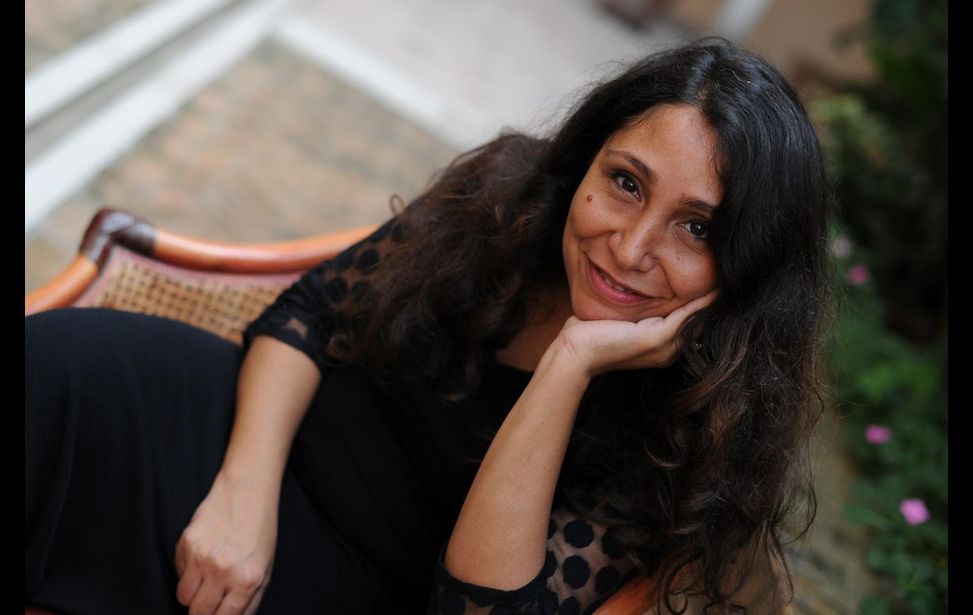'Wadjda' The Little girl who just wanted to ride a bicycle
The First Fiction Film by a Female Director to come out of Saudi Arabia.
As unbelievable as it may seem, in Saudi Arabia it is not possible to go to the cinema, as no public cinemas exist. In order to see a film, film lovers must go to the nearby country of Bahrain. This is one of the reasons why the film, ‘Wadjda’ which was filmed in Saudi Arabia and has recently been released in Europe and the United States is so unique. However it is not the only reason, the second one, is because it was directed by the country’s only female film director, Haiffa Al Mansour (as seen in photos 1 - 2). It is the result of a collaboration between a number of production companies, including a Saudi Arabian production company and a German production company, Razor Film.
Wadjda is the first fiction film of Haiffa Al Mansour. Her first production was a documentary entitled, ‘Woman without a shadow’ and questioned Saudi Arabian women on their ‘relationships’ with men. Wadjda is also concerned with the way women are treated in Saudi Arabia, but this time takes as its subject a young girl named Wadjda played by Waad Mahommed (seen in photo 3). It recounts the story of Wadjda, who lives in the suburbs of Riyadh and dreams of being able to ride a bike with her neighbour Abdallah. However this is Saudi Arabia and the law forbids females from riding a bike, as this activity is considered to compromise their virtue.
The mother of Wadjda is initially complicit in repressing her little girl’s only dream. She refuses to give her the money to buy one, but what choice does she have in a country where her child will be punished if she is seen riding a bike. However, Wadjda determined to find the 800 Ryals needed to buy the bike that she has seen in a nearby bike shop (as seen in photo 4), begins a range of entrepreneurial activities in an attempt to earn the money. These include taking part in a Koran reciting competition which she wins. However honesty is her downfall. When she announces that with her prize money she is going to buy a bike, the money is immediately taken away from her.
There is no doubt that if Wadjda lived in a country where Sharia law did not exist she would affectionately be known as a tom boy. In the film, we cannot help but smile at her act of rebellion, in wearing a pair of converse trainers under the black gown that she is obliged to wear in public (as seen in photo 5).
Her friendship with her young neighbour Abdallah is touching, and when he gives her a present of a bicycle helmet her delight is such that she wears it in the house (as seen in photo 6).
The film is poignant for many reasons but particularly because what is striking is that Wadjda’s dream is on the face of it such a simple one, she ‘just’ wants to be able to ride a bike. This film demonstrates that when some one’s human rights are compromised even the simplest dream can be a huge mountain to overcome.
Through her film Wadjda the director also gives us a rare insight into what everyday life is like in Saudia Arabia, and as well as experiencing the sadness of the young Wadjda we also experience that of her mother who must accept that her husband takes a second wife as she is unable to give him a son (as seen in photo 7).
The film is a triumph not only because the story is so moving, but also because it is any wonder that Haiffa Al Mansour managed to see it to completion. Casting Wadjda was an enormous challenge in a country where it was almost impossible to find parents who would give their daughter permission to act in a film. Haiffa Al Mansour has also said that at times when filming in particularly conservative areas she was forced to hide in a van, so as not to draw attention to herself, and direct the film via a walkie talkie.
We can’t help but wonder what future the young actress who played Wadjda will have. In the years to come will her daughters be able to ride a bike. Only time will tell, but one thing is certain this film is a courageous artistic act of protest. We can only hope that this film will be one small step in enabling women to gain equal rights.
All photos courtesy of Soda Pictures














